Bolivarianism is a mix of panhispanic, socialist and nationalist-patriotic ideals named after Simón Bolívar, the 19th-century Venezuelan general and liberator from the Spanish monarchy then in abeyance, who led the struggle for independence throughout much of South America.
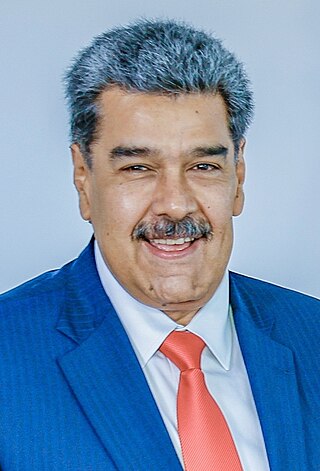
Nicolás Maduro Moros is a Venezuelan politician and the 53rd president of Venezuela since 2013. Previously, he was the 24th vice president of Venezuela from 2012 to 2013, the minister of foreign affairs from 2006 to 2012, and the 3rd president of the National Assembly of Venezuela from 2005 to 2006.

Luciano Marín Arango, better known as Iván Márquez, is a Colombian guerrilla leader, member of the Revolutionary Armed Forces of Colombia (FARC), part of its secretariat higher command and advisor to the Northwestern and Caribbean blocs. He was part of the FARC negotiators that concluded a peace agreement with President Juan Manuel Santos. On 29 August 2019, Márquez abandoned the peace process and announced a renewed armed conflict with the Colombian government.

Colombia–Venezuela relations refers to the diplomatic relations between the South American neighboring countries of Colombia and Venezuela. The relationship has developed since the early 16th century, when Spanish colonizers created the Province of Santa Marta and the Province of New Andalucia. The countries share a history of achieving their independence under Simón Bolívar and becoming one nation—the Gran Colombia—which dissolved in the 19th century. Since then, the overall relationship between the two countries has oscillated between cooperation and bilateral struggle.

The Democratic Unity Roundtable was a catch-all electoral coalition of Venezuelan political parties formed in January 2008 to unify the opposition to President Hugo Chávez's United Socialist Party of Venezuela in the 2010 Venezuelan parliamentary election. A previous opposition umbrella group, the Coordinadora Democrática, had collapsed after the failure of the 2004 Venezuelan recall referendum.

The president of the National Assembly is the presiding officer (speaker) of the National Assembly, Venezuela's unicameral legislature. The president's term coincides with the term of the legislature. The post has existed since the election of the first National Assembly in 2000. Before the creation of the National Assembly with the adoption of the 1999 constitution, the country's legislature was the bicameral Congress, which contained the Senate and the Chamber of Deputies. The last president of the Senate was Luis Alfonso Dávila, and the last president of the Chamber of Deputies was Henrique Capriles Radonski.
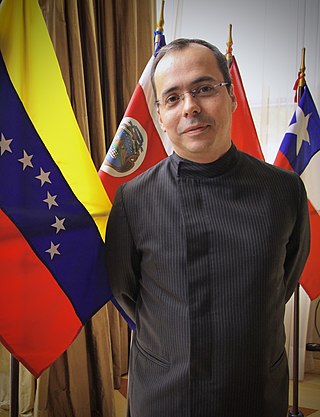
Juan José Rendón Delgado, known professionally as J. J. Rendón, is a Venezuelan political consultant, psychologist, and political activist, known for being the one who has directed and won the most electoral campaigns. He specializes in crisis resolution and is a human rights activist. He is a political asylee in the United States.

Freddy Guevara is a Venezuelan politician. He was elected deputy to the Venezuelan National Assembly for Circuit 2 of the Miranda State representing the Democratic Unity Roundtable in the parliamentary elections of December 6, 2015. He has been a key figure of the opposition to Nicolás Maduro, Guevara was arrested in July 2021 charged with crimes against the state. The United States and others condemned the arrest as politically-motivated. In mid-August, he was freed as part of negotiations between the Maduro government and the Venezuelan opposition.
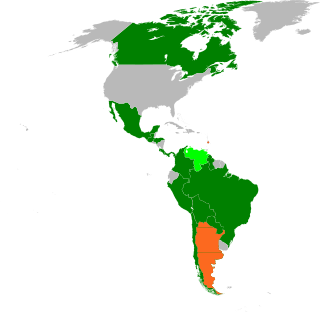
The Lima Group is a multilateral body that was established following the Lima Declaration on 8 August 2017 in the Peruvian capital of Lima, where representatives of 12 countries met in order to establish a peaceful exit to the ongoing crisis in Venezuela.

Juan Gerardo Antonio Guaidó Márquez is a Venezuelan opposition politician. He belonged to the social-democratic party Popular Will, and was a federal deputy to the National Assembly representing the state of Vargas.
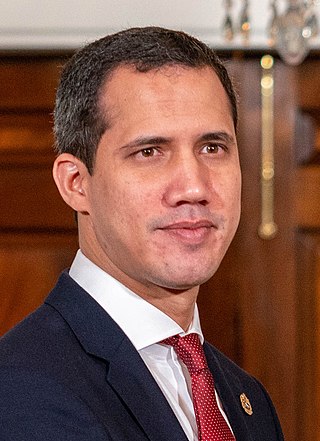
The Venezuelan presidential crisis was a political crisis concerning the leadership and the legitimate president of Venezuela between 2019 and 2023, with the nation and the world divided in support for Nicolás Maduro or Juan Guaidó.

Gustavo Tarre Briceño is a Venezuelan politician, lawyer, author, professor of constitutional law and politic science, and representative to the Organization of American States (OAS).
The Local Committees for Supply and Production are food distribution committees promoted by the Venezuelan government in which the communities themselves supply and distribute the priority foods through a house-to-house delivery method. It was established in 2016 by President Nicolás Maduro in response to the shortages in Venezuela. The committees have been subject of complaints about corruption, political use, delays, poor food quality and price increases without prior warning. This service is a subsidiary of the Ministry of Popular Power for Food.

During the presidential crisis between the Venezuelan governments of Nicolás Maduro and Juan Guaidó, a coalition of Colombia, Brazil, the United States and the Netherlands attempted to bring essential goods as a response to shortages in Venezuela. The three main bases used for the operation are: the Colombian city of Cúcuta, the Brazilian state of Roraima,, and the island of Curaçao, of the Kingdom of the Netherlands.
Freddy Superlano Salinas is a Venezuelan politician, educator and engineer who served as a member for the Popular Will party in the National Assembly from 2016 to 2021. He is an outspoken critic of Nicolás Maduro and the United Socialist Party of Venezuela. He was also a candidate for the governor of Barinas state for the Democratic Unity Roundtable in the 2017 election, which he lost to the pro-government candidate Argenis Chávez.

During the Venezuelan presidential crisis concerning the legitimate President of Venezuela, reactions and responses to the crisis were greatly divided.
The negotiations during the crisis in Venezuela are the negotiation and dialogue attempts and processes between the government of Nicolás Maduro and the Venezuelan opposition. Although numerous dialogue processes and roundtables have taken place, by 2023 none had been effective in achieving a solution to the country's crisis.

The COVID-19 pandemic in Venezuela was a part of the worldwide pandemic of coronavirus disease 2019 caused by severe acute respiratory syndrome coronavirus 2. The first two cases in Venezuela were confirmed on 13 March 2020; the first death was reported on 26 March. However, the first record of a patient claiming to have symptoms of coronavirus disease dates back to 29 February 2020, with government officials suspecting that the first person carrying the virus could have entered the country as early as 25 February.
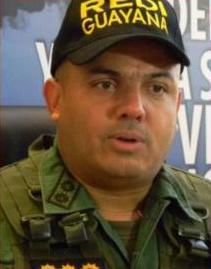
Cliver Antonio Alcalá Cordones, is a retired Venezuelan major general and a member of the Bolivarian Army. Alcalá was one of the soldiers who participated in the attempted coup d'état against President Carlos Andrés Pérez in February 1992, and served as chief of garrison in the cities of both Valencia and Maracay, and finally as general commander of the Integral Defense Region in Guayana (REDI-Guayana). Alcalá Cordones was discharged from the Army on 5 July 2013 during the presidency of Nicolás Maduro.

Venezuelan opposition to the Chavista governments of former President Hugo Chávez and current President Nicolás Maduro, commonly referred to as the Venezuelan opposition, or sometimes, anti-Chavismo, is a political umbrella term used to describe political, social and religious movements that have opposed Chavismo, and the associated Bolivarian Revolution political process since 2 February 1999.


















